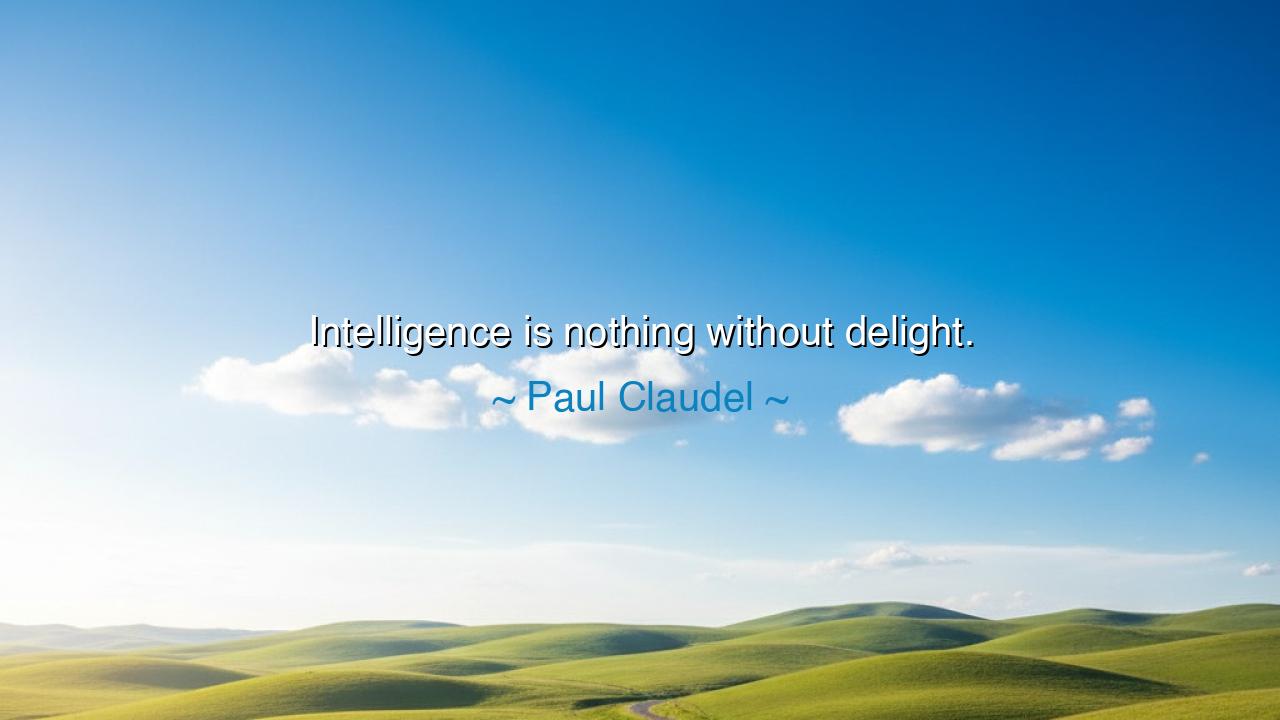
Intelligence is nothing without delight.






The words of Paul Claudel, poet, dramatist, and man of faith, are radiant with both simplicity and depth: “Intelligence is nothing without delight.” In these few syllables lies a truth that spans both heaven and earth — that the human mind, however brilliant, is barren without the warmth of joy, that thought without delight becomes sterile, and that understanding without wonder is but a shadow of true wisdom. Claudel, a soul torn between intellect and spirit, knew that the purpose of knowledge is not merely to dissect or define, but to awaken love — the love of truth, of beauty, of creation itself. Thus, his words stand as a song to remind the thinkers of the world that intelligence reaches its highest form only when it dances with delight.
To understand the origin of this saying, we must look into the life of Paul Claudel himself — a man of paradox, who stood at the crossroads of art and devotion. Born in France in 1868, Claudel was a diplomat and a poet, living amid the turmoil of modern thought and the renewal of faith. In his youth, he was drawn to the austere intellectualism of his sister, the sculptor Camille Claudel, and to the cold rationalism of his age. Yet it was in the quiet of a cathedral, during a Christmas Mass at Notre-Dame, that he felt the fire of the divine awaken within him. From that moment, he saw that intellect alone could not fill the heart — that delight, the luminous joy of being, was the soul’s truest nourishment. His life thereafter became a union of intellect and faith, of poetry and rapture, of knowledge tempered by awe.
When Claudel says that “Intelligence is nothing without delight,” he does not diminish the value of thought — he ennobles it. He reminds us that intelligence, by itself, is like a clear, still lake — it reflects but does not flow. It must be stirred by the wind of emotion, of curiosity, of passion, if it is to give life. Delight is not mere pleasure; it is the soul’s recognition of truth. It is what the Greeks called thaumazein — wonder — the first spark of philosophy. Without delight, the mind becomes calculating but not creative, logical but not luminous. It is delight that turns study into revelation, labor into art, and reason into wisdom.
The ancient philosophers understood this. Aristotle once said that “all men begin to philosophize from wonder.” It is delight that makes the child gaze at the stars and ask “why,” and that same spark drives the scientist to unravel the cosmos. The mathematician who delights in the harmony of numbers, the artist who delights in the dance of color, the poet who delights in the mystery of words — all are guided by that same sacred joy. Without it, even the sharpest mind becomes cold, like a sword that no longer serves the heart. But when intelligence and delight are joined, they form the true mark of genius: a mind that not only knows, but loves.
Consider the story of Leonardo da Vinci, that radiant spirit of the Renaissance. His intelligence was unmatched, yet what made his work eternal was his delight — his joy in discovery, in the flight of birds, in the shimmer of light upon water, in the human form that to him reflected the divine. Leonardo once wrote, “The noblest pleasure is the joy of understanding.” In him, Claudel’s wisdom lives fully realized — for Leonardo’s intelligence was not driven by ambition, but by delight in the wonder of creation. Every invention, every sketch, every experiment was a hymn to the beauty of knowing. His brilliance was not a burden, but a celebration.
Claudel’s words also carry a warning for our own age — an age of restless intellect, of knowledge multiplied yet joy diminished. We have built machines that think faster than men, but we have forgotten how to delight in thinking itself. We accumulate facts without savoring meaning, and our intelligence, though vast, grows hollow. The ancients would have called this hubris — when reason, stripped of wonder, becomes self-serving. Claudel’s voice rises against this emptiness, calling us back to the sacred unity of thought and joy. For without delight, knowledge ceases to serve life; it becomes a sterile flame that burns but does not warm.
Thus, the lesson of Paul Claudel’s words is both gentle and profound: to live wisely, one must learn to think joyfully. Let your intelligence not be a cage of reason, but a garden of discovery. Seek knowledge not as a conquest, but as a communion. When you study, when you create, when you labor — let delight be your companion, for joy sharpens the mind and purifies the soul. Remember that truth, to be whole, must be not only understood but loved.
So, dear listener, carry this teaching as the ancients carried their sacred maxims: that intelligence without delight is a barren light, and delight without intelligence is a wandering flame. But together, they form the fire of creation — the mind aflame with joy. Cultivate your intellect, yes, but let your heart rise beside it. Take delight in learning, in art, in nature, in the quiet beauty of thought itself. For only then will your intelligence not merely grasp the world — it will illumine it. And in that marriage of mind and joy, you will find not only wisdom, but the very meaning of life.






AAdministratorAdministrator
Welcome, honored guests. Please leave a comment, we will respond soon